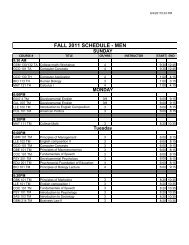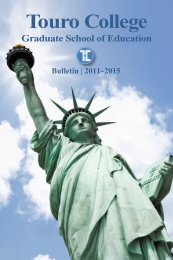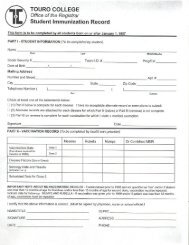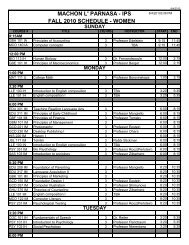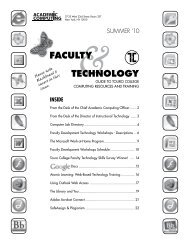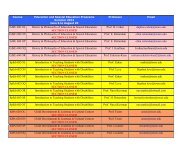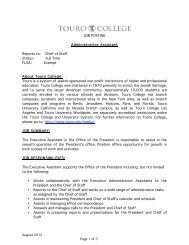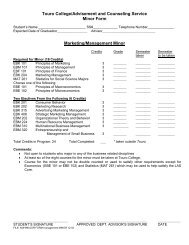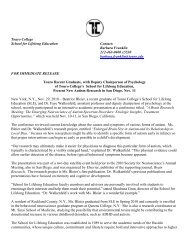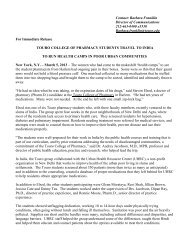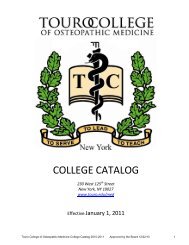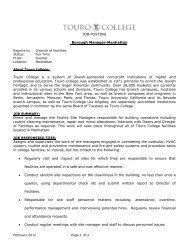Making the World a Better Place - Touro College
Making the World a Better Place - Touro College
Making the World a Better Place - Touro College
You also want an ePaper? Increase the reach of your titles
YUMPU automatically turns print PDFs into web optimized ePapers that Google loves.
Rory Gilbert, senior vice president of case management<br />
and community services at The Bridge, Inc., echoes this<br />
sentiment. “Bobby’s experience, overall demeanor and<br />
clinical skills make him an invaluable leader. He has a stature<br />
that allows him to go out and deal with a lot of things o<strong>the</strong>r<br />
people can’t deal with.”<br />
Gilbert cites a recent example when Staley, who is tall and<br />
sturdy, went to check on a client living in ACT’s housing<br />
program who had violated <strong>the</strong> program guidelines. Gilbert<br />
says, “There was someone hiding in <strong>the</strong> closet who wasn’t<br />
supposed to be <strong>the</strong>re. There was concern that drug dealers<br />
were possibly in <strong>the</strong> apartment. Bobby went in and got<br />
everyone out, preventing drama and fur<strong>the</strong>r excitement.”<br />
Complimenting his negotiation skills, Gilbert says Staley<br />
also has a way of “meeting <strong>the</strong> clients where <strong>the</strong>y are. He can<br />
use <strong>the</strong> language of <strong>the</strong> client to get his point across and create<br />
very savvy contracts around client behavior and functioning.”<br />
A New York City native, Staley has been with ACT for two<br />
years, but has been doing social work his whole life. “Social<br />
work is innate,” he says. In <strong>the</strong> 1970s, when he was a<br />
teenager, Staley helped his fa<strong>the</strong>r, who worked in high<br />
schools as an anti-poverty advocate, working on afterschool<br />
programs and basketball tournaments.<br />
His first formal foray into <strong>the</strong> human services field was in<br />
1992, working as a substance abuse counselor at <strong>the</strong> Faith<br />
Mission, a sobering station in Jamaica, Queens. From <strong>the</strong>re,<br />
he went to ano<strong>the</strong>r agency, where he honed his case<br />
development skills and eventually transitioned to working with<br />
<strong>the</strong> HIV population. He <strong>the</strong>n went on to work in scatter-site<br />
housing programs, eventually becoming a director at <strong>the</strong><br />
Fortune Society, an organization that serves <strong>the</strong> formerly<br />
incarcerated. While at <strong>the</strong> Fortune Society, Staley decided he<br />
wanted to get his master’s degree in social work, which<br />
seemed like a natural next step.<br />
He looks back on his <strong>Touro</strong> days fondly. “I can’t imagine<br />
that <strong>the</strong>re’s ano<strong>the</strong>r program as intimate or nurturing,” he<br />
says, citing <strong>the</strong> diversity of <strong>the</strong> student population as a<br />
particularly big draw. “Having to learn about different cultures<br />
increased our cultural competency skills and made that<br />
experience magnificent.”<br />
“He has <strong>the</strong> stature that<br />
allows him to go out and<br />
deal with a lot of things<br />
o<strong>the</strong>r people can’t deal<br />
with.”<br />
– Rory Gilbert of The Bridge, Inc.<br />
Bobby Staley at work.<br />
Photography: Fly on <strong>the</strong> Wall Productions<br />
TOURO LINKS I SPRING 2013 19



